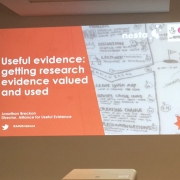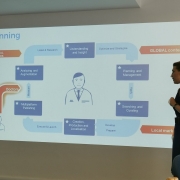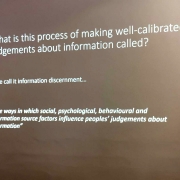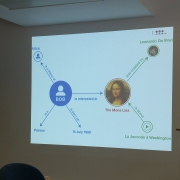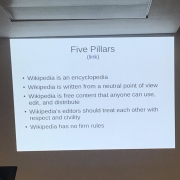November 2019 Seminar: Useful evidence: getting research evidence valued and used.
Summary
At this meeting Jonathan Breckon of the Alliance for Useful Evidence explained the role of his organisation. It is a network, hosted by the UK’s innovation charity Nesta, the government’s vehicle for designing, testing and scaling new solutions to some identified problems. These organisations champion the smarter use of evidence in social policy and practice. They do this through advocacy, convening events, sharing ideas and resources, and supporting individuals and organisations through advice and training. The work is promoted through an open access network of more than 4,300 individuals from across government, universities, charities, businesses, and local authorities in the UK and internationally which we could all join for free. He then described the COM-B framework for encouraging research use, developed by researchers at UCL, and adopted by a range of foundations and government agencies in UK and overseas.
COM-B is a ‘behaviour system’ involving three essential conditions: Capability, Opportunity and Motivation and it forms the hub of a ‘behaviour change wheel’ (BCW), around which are positioned the nine intervention functions aimed at addressing deficits in one or more of these conditions; around this are placed seven categories of policy that could enable those interventions to occur. It has been used in a number of applications, mainly health related. We looked at ways to improve hearing-aid use in adult auditory rehabilitation. He also presented the factors that influence medication-taking behaviour, a tobacco control strategy, and the NICE Obesity Guidelines.
We learned that research evidence is just one factor that can influence decision-making at a policy and practice level. Various interventions have been developed to enhance and support the use of research evidence by decision-makers. Jonathan explained that in order to decide which interventions are most effective, there had been a systematic review of research into research use, leading to these new methods for characterising and designing behaviour change intervention. He provided us with some practical tips on the best mechanisms for more generally getting research evidence valued and used. This then led into small group discussions where we were given time to consider what was relevant to our own organisations and how we could make use of these insights within their own work programmes.
Speakers
Jonathan Breckon has been the Director of The Alliance for Useful Evidence since it was created at Nesta in 2012. Formerly Director of Policy and Public Affairs at the Arts and Humanities Research Council, he has had policy roles at the Royal Geographical Society, the British Academy, and Universities UK. He is a member of the Cabinet Office What Works Council and a Director of the Department for Education’s What Works for Children’s Social Care. His research and professional interests cover politics and psychology, particularly the relationship between evidence and policy-making. He is a Visiting Professor at Strathclyde University and a Visiting Senior Research Fellow at King’s College London’s Policy Institute. His research and professional interests cover politics and psychology, the relationship between evidence and policy-making, and the role of professional bodies, such as medical Royal Colleges, in applying evidence-based practice. When not at work, or being ordered around by two young children, he wastes time protecting his family’s veg garden from slugs or finding excuses to go sailing in the Solent.
Time and Venue
2pm on 21st November 2019, The British Dental Association, 64 Wimpole Street, London W1G 8YS
Slides
No slides available for this presentation
Tweets
Blog
There is no blog report for this seminar.
Study Suggestions
Nesta Website: https://www.nesta.org.uk/

